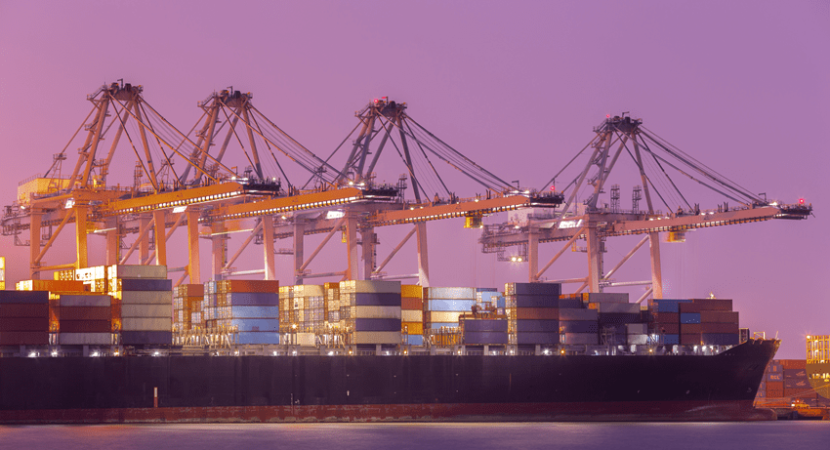
Event promoted by FGV Transportes, on 21/07/2020, addresses topics on Ports, Privatization and future prospects for the market
A privatization of sectors in Brazil, in recent years, has had great repercussions and speculation by citizens and, with its pros and cons. The possibility of privatization was not only based on education, health and security, but also on the port sector. The Webnar organized by FGV, moderated by Marcus Quintella, Coordinator of the FGV TRANSPORTES and Clythio Buggenhout, Director of Government Relations at Cargill and President of the Board of the Associação Brasileira de Terminais Portuários – ABTP, addressed the privatization initiative of Brazilian ports as a subject, in order to end speculation and present measurable expectations with professionals in the area for the market.
Read also
- Logistics solutions company offers job opportunities for the states of SP, TO and MG
- Amid the pandemic, cabotage moves 60,8 million tons between January and April
- Logistics and transport company opens job openings this April 07th for Macaé and Campos dos Goytacazes
- Port support sector in Brazil built 120 tugboats in national shipyards in the last ten years
The invited speakers presented their expectations and concerns about the theme of the webinar, namely: Fábio Abrahão, Director of Infrastructure, Concessions and PPPs at BNDES – Patricia Lascosque, Superintendent of Ports at Suzano and President of the Association of Private Port Terminals – ATP and Ricardo Arten, CEO of Brasil Terminal Portuário – BTP.
Considering privatization leads us to the question of competence of the government of a country and, regarding Brazil, there are risks of alienation and the uncertainty of a privatization under government control. Similarly, as currently happens in some ports that are private and suffer from major political intervention.
Brazil, as it always had strong public power in education, health and security, ended up being weakened after several crises and despite privatization being a path taken by neighboring countries. In fact, there are doubts whether in Brazil this strategy is the best way out. However, we cannot deceive ourselves when looking at the economy of other countries because the economic strategy is not based on copy and paste.
The truth is that there are many other administrative and cultural issues that make up a country as a whole. Furthermore, it is not only the national culture that differentiates the progress of the same strategy applied by different bodies, regional and business cultures also stimulate productivity, or the lack thereof.
EXPECTATIONS OF THE PRIVATIZATION OF THE PORT SECTOR
Privatization opens doors to economic development with efficient and effective solutions that come from the 4 pillars of administration, currently applied by the Brazilian government in ports, as presented by the speaker at Webnar held in partnership with FGV Ricardo Arten, CEO of Brasil Terminal Portuário – BTP:
1. Legal Security – The strategy starts in a certain way and in the middle of the way the specifications are changed. Thus, causing the Business Case to be dismissed.
2. Bureaucracy – There is bureaucracy even to make investments, and you have to ask for authorization for everything, with licenses that take years to be approved.
3. Excessive regulation – Regulation is put in place in all processes with bodies that make contrary decisions for the same matter. That is, it ends up not having a clear and objective rule in decision-making.
4. Price Control – The ideal business strategy, confirmed by the Central Bank, is prices regulated by the market and not by agencies or the government.
THE ROLE OF THE GOVERNMENT WITH REGARD TO THE ADMINISTRATION OF BRAZILIAN PORTS ACCORDING TO FGV
The government's role in managing ports is currently focused on legal certainty and not on long-term investment with the possibility of attracting shipowners and increasing cabotage. This legal uncertainty prevents the port sector from effectively participating in the economic market. Since without the right investments, ports do not acquire the necessary potential to compete, stand out and grow.
With the total privatization of the ports, the administrative power will be decentralized, and each port will have its needs and potentials met in an efficient way and without the excessive bureaucratization existing in the public administration.
Based on what Fábio Abrahão, Director of Infrastructure, Concessions and PPPs at BNDES, said, there is no ideal model of legal certainty. Furthermore, privatization comes in to solve the bureaucratic obstacle, where the main business is the provision of infrastructure services at the lowest cost, thus achieving efficiency.
PORTS PRIVATIZATION INITIATIVE ACCORDING TO FGV
The market considers that port operations in our country are already privatized, as a result of the Law 8.630 / 1993, despite the absence of a policy for the restructuring of the sector that could include the complete application of the Law and its restructuring, associated with social, economic, regional and sustainability aspects.
The initiative of privatization of Brazilian ports aims to find a better administration contract, with negotiations at market price barring the abusiveness of the business and proposing progressive activity in privatization. Finally, it ends up preventing an economic and administrative return by the government.
However, the main concern in the discussion of the privatization of ports is the effectiveness of implementation, since it will have to be analyzed to what extent the government can intervene in the processes of private companies, in addition to the need for a lifetime contract preventing government changes from and policies interfere with privatization.
“…if we are counting on a period of 3 years or 4 years, if there is any risk of ideological, political or philosophical discontinuity, we will have closed 4 years discussing here, we, a business without any effectiveness, without objective improvement in the current management…”
Clythio Buggenhout
Currently there are ports that are already privatized, but respond to the government for quality management, security, among other processes. According to the president of TPC, Patricia Lacosque, excessive bureaucracy and legal uncertainty impede economic progress. All this even with the ports being managed by private companies.
“…there is a lot of government interference, from government control bodies that want to regulate the level of service that I provide for myself… there is a series of interference and immobilization that even for the private sector is very heavy in Brazilian regulation and this also needs be faced. So if the solution is to privatize the terminals in general, great! But if this level of control, regulation, bureaucracy continues to exist, we will still not be able to be competitive”
Patricia Lacosque
WHAT IS THE LANDLORD MODEL MENTIONED BY FGV EXPERTS ALL ABOUT?
LandLord Port is a port management model adopted by the Brazilian government for the exploration of its port system. In this model, the port infrastructure is provided by the State, and the private sector is responsible for providing the superstructure and carrying out port operations, through leases (concessions).
In Brazil, the adopted model is the landlord port. In it, the port authority is carried out by the public power, which acts as a regulatory body and also as the owner of the port. Operations, such as, for example, cargo handling, are operated by private entities, which through a concession can operate in that port. Companies that receive the right to commercially exploit the port are obliged to invest in superstructure and equipment.
Another model is the Tool Port, where the port authority is public, and responsible for the port's infrastructure, superstructure and machinery. Operations are the responsibility of port operators, who pay a fee to explore the port.
Finally, it is worth noting that the privatization of port administration is not a practice recommended by the World Bank. For the international organization, port management should seek not only profit, but also regional development and the country's growth. Sérgio Aquino, president of the National Federation of Port Operators (Fenop), spoke to Portogente about the Development and Zoning Plan (PDZ) of the Port of Santos, and warned that the best path is legislative modernization in relation to bureaucracy, and attentive to the fact that good public administration is enough to have good results.













I learned that thousands of Cubans migrated to…
Where did you get this data from? Cuba…
Where there are large agricultural areas, smaller…
Really Monica, and the floods in RGS…
It is necessary for a country with a…
And Fernando, you’re not just stupid…
Just one last observation. Concentration of barracks…
If you come with this you can separate one…